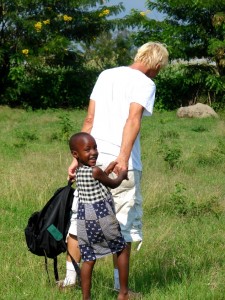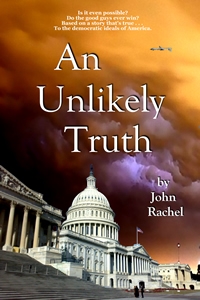 I make no secret of this. I have a book which was just published this year that I hope will change the world.
I make no secret of this. I have a book which was just published this year that I hope will change the world.
Two-and-a-half years in the making, it’s not just more pulp fiction to add to the pile. I wrote this with serious intentions of making a difference __ a huge difference __ in the way America goes about its elections.
The great thing about writing a novel is being able to speak through the characters. Martin Truth is my main character for An Unlikely Truth. Martin is a third-party congressional candidate making his fourth attempt at ousting a duplicitous, blowhard, right-wing incumbent in Ohio’s conservative 3rd District. Like many __ how about most? __ politicians these days, the incumbent says one thing, then does the exact opposite. His loyalty is to big campaign donors, corporate sponsors, and deep-pocketed oligarchs, at the expense of his well-meaning but gullible constituents. In baffling but predictable lockstep, people keep voting this guy back in, even though it’s ultimately against their own interests __ sound familiar?
Martin wants to put some integrity back into politics, at least in his district, and fights an incredibly difficult battle against near impossible odds and the ruthless tactics and brutal smear campaign of his opponent, driven by a naive but firm belief in the fundamental right of voters to be properly represented.
Here is a key passage from the book . . .
“What did Martin Truth stand for?
As the Green Party candidate he obviously believed in protecting the environment. Something had to be done to stop global warming, if it wasn’t too late already. We had to end our addiction to fossil fuels, especially oil. There should be huge private and public investments in renewable alternative energy sources: wind, ocean, solar. We had to reverse deforestation. End desertification. Halt the privatization of water and other basic necessities. Encourage local food production, promote organic agriculture, and reduce the use of pesticides and GMO seeds. In general, the world needed to back off corporatizing everything and return to local production and control. With bold and determined political leaders on the front lines, it needed to confront and defeat the multinational corporate juggernaut that was polluting and destroying the Earth.
As might be expected, Martin’s progressivism extended broadly from his commitment to environmental causes to a number of co-related social issues. He categorically took exception to the every-man-for-himself madness of the right wing and believed that all of us through representative government should take a greater role in helping others, especially those who were less able to fend for themselves. This included the old, the infirm, victims of racism and other forms of discrimination. And those who had lost their jobs and fallen on hard times. The poor. The undereducated. Children. Most definitely children! Without a doubt, Martin would be labeled as a bleeding-heart liberal by the crass law-of-the-jungle conservatives, who he thought lacked both compassion and common decency, people who called themselves Christians but somehow missed the most obvious and critical aspects of Christ’s teachings: Feed the hungry, clothe the poor, heal the sick, tend to the needs of the less fortunate.
‘For I was hungry, and you gave Me something to eat; I was thirsty, and you gave Me something to drink; I was a stranger, and you invited Me in; naked, and you clothed Me; I was sick, and you visited Me; I was in prison, and you came to Me … Truly I say to you, to the extent that you did it to one of these brothers of Mine, even the least of them, you did it to Me.’ – Matthew 25:35/36/40
Hardly what could be called a Bible-thumper, questionably even a Christian at all by any conventional standards, Martin had used that passage in his campaign literature last election season. Very few voters seemed to appreciate its relevance to the progressive ideals he espoused. If they did, they still managed to forget about him when it came time to vote.
Martin was also deeply committed to human rights, under relentless assault long before humankind even recognized what they were. It was ironic that now in many countries which had long had an onerous record of human rights abuses, there were significant improvements, while in America itself, allegedly champion of humane and just treatment, fairness, and respect for all, human rights was suffering dismal setbacks every day.
He was especially concerned about the intrusive levels of officially unacknowledged surveillance, and the constant push for locking up more and more citizens. There seemed to be a new mentality taking over which destroyed any sense of proportion and reason with respect to incarceration. It certainly was destroying justice and equality before the law. The operating principle was: If we build it, they will come. Or more to the point: We’ve built a helluva lot of these prisons, now we’ve got to fill them! They were filling the prisons all right. Mostly with people of color.
Admittedly, there was a lot on his wish list, a substantial catalog of action items which embraced the things Martin thought had to be done immediately to reverse the downward, self-sabotaging course of the country. It was a daunting set of tasks requiring the energy of the whole nation working together, unified and determined in their dedication to rebuild a great America.
Daunting or not, these were the things which drove him to seek a seat in Congress.
These were the things he thought crucial for a better world.”
People love to label others. Somehow this puts them at ease. Once they’ve put someone in a box, they feel they can deal with them. Or just dismiss them and walk away. I full agree with Martin Truth. So what does this make me? A liberal? A socialist?
I think it just makes me a decent human being.  If I ever have to stand trial, I hope to call to the stand a character witness who merely says that. “Like Martin Truth, John is a decent human being. He just wants a better world.”
If I ever have to stand trial, I hope to call to the stand a character witness who merely says that. “Like Martin Truth, John is a decent human being. He just wants a better world.”
An Unlikely Truth has been out since mid-February. Just go here for all of the ways to pick up a copy. If the reviews are to be believed, it’s a good read with a solid message.
I certainly hope your reading it will be as inspiring as it was for me to write it.
Peace.




Character Witness
Two-and-a-half years in the making, it’s not just more pulp fiction to add to the pile. I wrote this with serious intentions of making a difference __ a huge difference __ in the way America goes about its elections.
The great thing about writing a novel is being able to speak through the characters. Martin Truth is my main character for An Unlikely Truth. Martin is a third-party congressional candidate making his fourth attempt at ousting a duplicitous, blowhard, right-wing incumbent in Ohio’s conservative 3rd District. Like many __ how about most? __ politicians these days, the incumbent says one thing, then does the exact opposite. His loyalty is to big campaign donors, corporate sponsors, and deep-pocketed oligarchs, at the expense of his well-meaning but gullible constituents. In baffling but predictable lockstep, people keep voting this guy back in, even though it’s ultimately against their own interests __ sound familiar?
Martin wants to put some integrity back into politics, at least in his district, and fights an incredibly difficult battle against near impossible odds and the ruthless tactics and brutal smear campaign of his opponent, driven by a naive but firm belief in the fundamental right of voters to be properly represented.
Here is a key passage from the book . . .
“What did Martin Truth stand for?
As the Green Party candidate he obviously believed in protecting the environment. Something had to be done to stop global warming, if it wasn’t too late already. We had to end our addiction to fossil fuels, especially oil. There should be huge private and public investments in renewable alternative energy sources: wind, ocean, solar. We had to reverse deforestation. End desertification. Halt the privatization of water and other basic necessities. Encourage local food production, promote organic agriculture, and reduce the use of pesticides and GMO seeds. In general, the world needed to back off corporatizing everything and return to local production and control. With bold and determined political leaders on the front lines, it needed to confront and defeat the multinational corporate juggernaut that was polluting and destroying the Earth.
As might be expected, Martin’s progressivism extended broadly from his commitment to environmental causes to a number of co-related social issues. He categorically took exception to the every-man-for-himself madness of the right wing and believed that all of us through representative government should take a greater role in helping others, especially those who were less able to fend for themselves. This included the old, the infirm, victims of racism and other forms of discrimination. And those who had lost their jobs and fallen on hard times. The poor. The undereducated. Children. Most definitely children! Without a doubt, Martin would be labeled as a bleeding-heart liberal by the crass law-of-the-jungle conservatives, who he thought lacked both compassion and common decency, people who called themselves Christians but somehow missed the most obvious and critical aspects of Christ’s teachings: Feed the hungry, clothe the poor, heal the sick, tend to the needs of the less fortunate.
‘For I was hungry, and you gave Me something to eat; I was thirsty, and you gave Me something to drink; I was a stranger, and you invited Me in; naked, and you clothed Me; I was sick, and you visited Me; I was in prison, and you came to Me … Truly I say to you, to the extent that you did it to one of these brothers of Mine, even the least of them, you did it to Me.’ – Matthew 25:35/36/40
Hardly what could be called a Bible-thumper, questionably even a Christian at all by any conventional standards, Martin had used that passage in his campaign literature last election season. Very few voters seemed to appreciate its relevance to the progressive ideals he espoused. If they did, they still managed to forget about him when it came time to vote.
Martin was also deeply committed to human rights, under relentless assault long before humankind even recognized what they were. It was ironic that now in many countries which had long had an onerous record of human rights abuses, there were significant improvements, while in America itself, allegedly champion of humane and just treatment, fairness, and respect for all, human rights was suffering dismal setbacks every day.
He was especially concerned about the intrusive levels of officially unacknowledged surveillance, and the constant push for locking up more and more citizens. There seemed to be a new mentality taking over which destroyed any sense of proportion and reason with respect to incarceration. It certainly was destroying justice and equality before the law. The operating principle was: If we build it, they will come. Or more to the point: We’ve built a helluva lot of these prisons, now we’ve got to fill them! They were filling the prisons all right. Mostly with people of color.
Admittedly, there was a lot on his wish list, a substantial catalog of action items which embraced the things Martin thought had to be done immediately to reverse the downward, self-sabotaging course of the country. It was a daunting set of tasks requiring the energy of the whole nation working together, unified and determined in their dedication to rebuild a great America.
Daunting or not, these were the things which drove him to seek a seat in Congress.
These were the things he thought crucial for a better world.”
People love to label others. Somehow this puts them at ease. Once they’ve put someone in a box, they feel they can deal with them. Or just dismiss them and walk away. I full agree with Martin Truth. So what does this make me? A liberal? A socialist?
I think it just makes me a decent human being. If I ever have to stand trial, I hope to call to the stand a character witness who merely says that. “Like Martin Truth, John is a decent human being. He just wants a better world.”
If I ever have to stand trial, I hope to call to the stand a character witness who merely says that. “Like Martin Truth, John is a decent human being. He just wants a better world.”
An Unlikely Truth has been out since mid-February. Just go here for all of the ways to pick up a copy. If the reviews are to be believed, it’s a good read with a solid message.
I certainly hope your reading it will be as inspiring as it was for me to write it.
Peace.